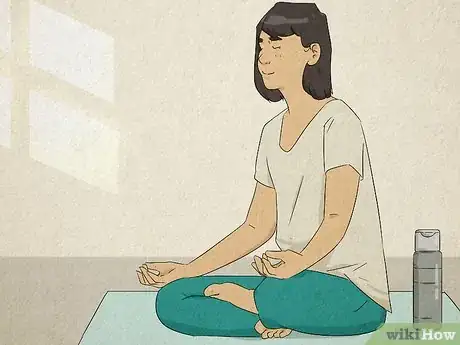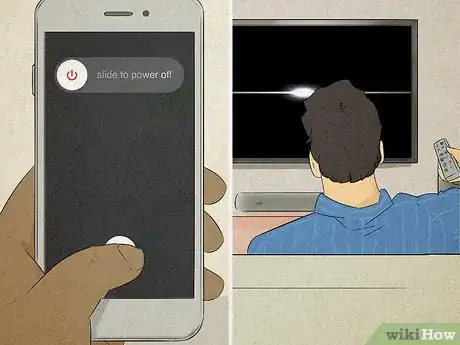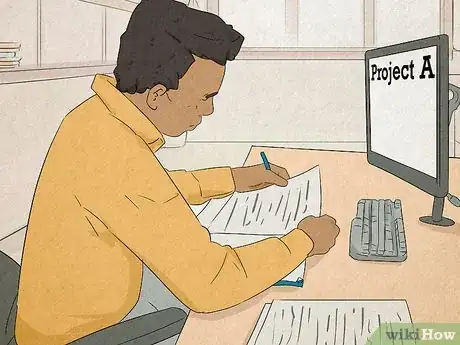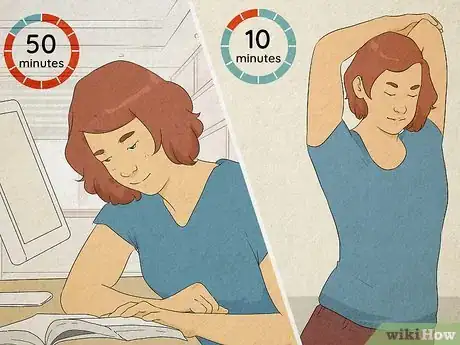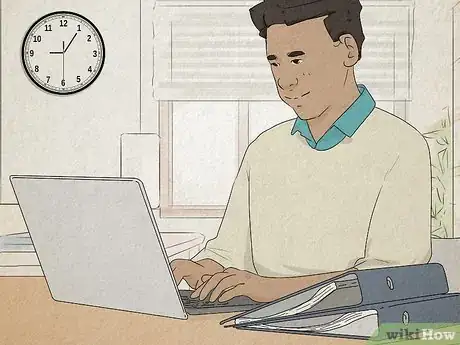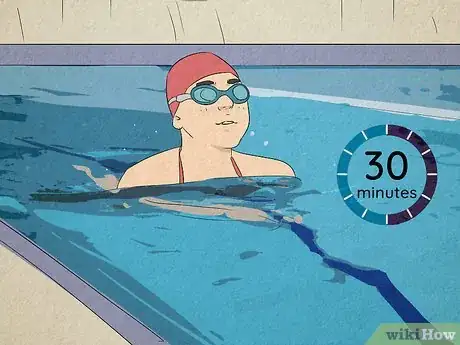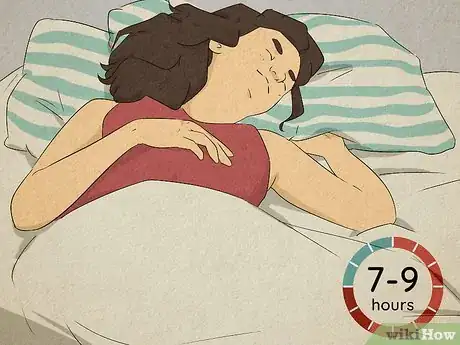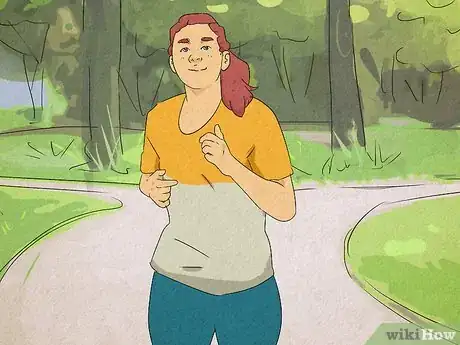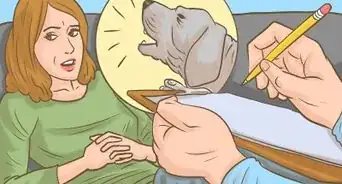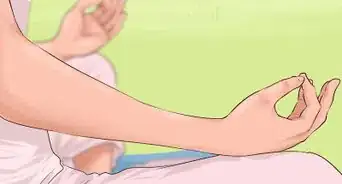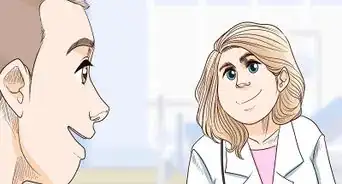This article was co-authored by George Sachs, PsyD and by wikiHow staff writer, Hannah Madden. George Sachs is a Licensed Psychologist and the Owner of Sachs Center based in New York, New York. With over ten years of experience, Dr. Sachs specializes in treating ADD/ADHD and Autism Spectrum Disorders in children, teens, and adults. He holds a BS in Psychology from Emory University. Dr. Sachs earned his Doctorate of Psychology (PsyD) from the Illinois School of Professional Psychology, Chicago. He completed his clinical training in Chicago at Cook County Hospital, Mt. Sinai Hospital, and the Child Study Center. Dr. Sachs completed his internship and postdoctoral work at the Children’s Institute in Los Angeles, where he supervised and trained therapists in Trauma-Focused Cognitive Behavioral Therapy (TFCBT). He has been trained as a Gestalt Therapist and certified by the Gestalt Associates Training Program of Los Angeles. Dr. Sachs is the author of The Adult ADD Solution, Helping the Traumatized Child, and Helping Your Husband with Adult ADD. He has appeared on the Huffington Post, NBC Nightly News, CBS, and WPIX discussing his holistic approach to ADD/ADHD treatment.
There are 7 references cited in this article, which can be found at the bottom of the page.
This article has been viewed 403,779 times.
If you have trouble focusing, it might be because you have a short attention span. Switching from one thing to another might be fun in your off hours, but it’s not very helpful when you’re trying to be productive. Fortunately, there are a few ways you can increase your attention span both in the moment and over time.
Steps
Expert Q&A
Did you know you can get expert answers for this article?
Unlock expert answers by supporting wikiHow
-
QuestionHow do I get better at focusing?
 George Sachs, PsyDGeorge Sachs is a Licensed Psychologist and the Owner of Sachs Center based in New York, New York. With over ten years of experience, Dr. Sachs specializes in treating ADD/ADHD and Autism Spectrum Disorders in children, teens, and adults. He holds a BS in Psychology from Emory University. Dr. Sachs earned his Doctorate of Psychology (PsyD) from the Illinois School of Professional Psychology, Chicago. He completed his clinical training in Chicago at Cook County Hospital, Mt. Sinai Hospital, and the Child Study Center. Dr. Sachs completed his internship and postdoctoral work at the Children’s Institute in Los Angeles, where he supervised and trained therapists in Trauma-Focused Cognitive Behavioral Therapy (TFCBT). He has been trained as a Gestalt Therapist and certified by the Gestalt Associates Training Program of Los Angeles. Dr. Sachs is the author of The Adult ADD Solution, Helping the Traumatized Child, and Helping Your Husband with Adult ADD. He has appeared on the Huffington Post, NBC Nightly News, CBS, and WPIX discussing his holistic approach to ADD/ADHD treatment.
George Sachs, PsyDGeorge Sachs is a Licensed Psychologist and the Owner of Sachs Center based in New York, New York. With over ten years of experience, Dr. Sachs specializes in treating ADD/ADHD and Autism Spectrum Disorders in children, teens, and adults. He holds a BS in Psychology from Emory University. Dr. Sachs earned his Doctorate of Psychology (PsyD) from the Illinois School of Professional Psychology, Chicago. He completed his clinical training in Chicago at Cook County Hospital, Mt. Sinai Hospital, and the Child Study Center. Dr. Sachs completed his internship and postdoctoral work at the Children’s Institute in Los Angeles, where he supervised and trained therapists in Trauma-Focused Cognitive Behavioral Therapy (TFCBT). He has been trained as a Gestalt Therapist and certified by the Gestalt Associates Training Program of Los Angeles. Dr. Sachs is the author of The Adult ADD Solution, Helping the Traumatized Child, and Helping Your Husband with Adult ADD. He has appeared on the Huffington Post, NBC Nightly News, CBS, and WPIX discussing his holistic approach to ADD/ADHD treatment.
Licensed Psychologist There's a hierarchy to assess. The first is sleep—if you're not getting a good night's sleep, it's hard to pay attention. If you're sleeping well and you're still not focusing, you might need to get more exercise. If you're moving your body enough and you're still having a hard time, you might need to check in and see if it's something you really want to do. You might also need to find an external motivation, especially if it's something you really have to get done.
There's a hierarchy to assess. The first is sleep—if you're not getting a good night's sleep, it's hard to pay attention. If you're sleeping well and you're still not focusing, you might need to get more exercise. If you're moving your body enough and you're still having a hard time, you might need to check in and see if it's something you really want to do. You might also need to find an external motivation, especially if it's something you really have to get done.
References
- ↑ http://time.com/2921341/stay-focused-5-ways-to-increase-your-attention-span/
- ↑ https://www.inc.com/amy-morin/7-scientifically-proven-ways-to-lengthen-your-attention-span.html
- ↑ https://www.entrepreneur.com/article/325492
- ↑ https://www.inc.com/amy-morin/7-scientifically-proven-ways-to-lengthen-your-attention-span.html
- ↑ https://healthcaremba.gwu.edu/blog/how-to-increase-attention-span/
- ↑ https://www.mheducation.com/highered/insights-ideas/multitasking-helpful-or-harmful.html
- ↑ http://www.inc.com/amy-morin/7-scientifically-proven-ways-to-lengthen-your-attention-span.html
- ↑ http://time.com/2921341/stay-focused-5-ways-to-increase-your-attention-span/
- ↑ George Sachs, PsyD. Licensed Psychologist. Expert Interview. 9 October 2020.
- ↑ George Sachs, PsyD. Licensed Psychologist. Expert Interview. 9 October 2020.
- ↑ George Sachs, PsyD. Licensed Psychologist. Expert Interview. 9 October 2020.
- ↑ George Sachs, PsyD. Licensed Psychologist. Expert Interview. 9 October 2020.
- ↑ http://www.inc.com/amy-morin/7-scientifically-proven-ways-to-lengthen-your-attention-span.html
- ↑ George Sachs, PsyD. Licensed Psychologist. Expert Interview. 9 October 2020.
- ↑ http://www.inc.com/amy-morin/7-scientifically-proven-ways-to-lengthen-your-attention-span.html
About This Article
Increasing your attention span can help you at school or work, and there are certain activities you can try to help you improve your focus. Classical music can help you concentrate, so try turning some on when you’re struggling to finish a task and see if it helps you work faster. Exercising daily is also a great way to boost your attention, so try to get a workout in every day. Another way to increase your focus is through daily meditation, so take time to meditate on your own or with a guided routine online. You can also use certain apps and websites, like Lumosity, Elevate, and MindNode, to play games or engage in challenges that push your focus to a new level. To learn how to manage your time more effectively, keep reading!
